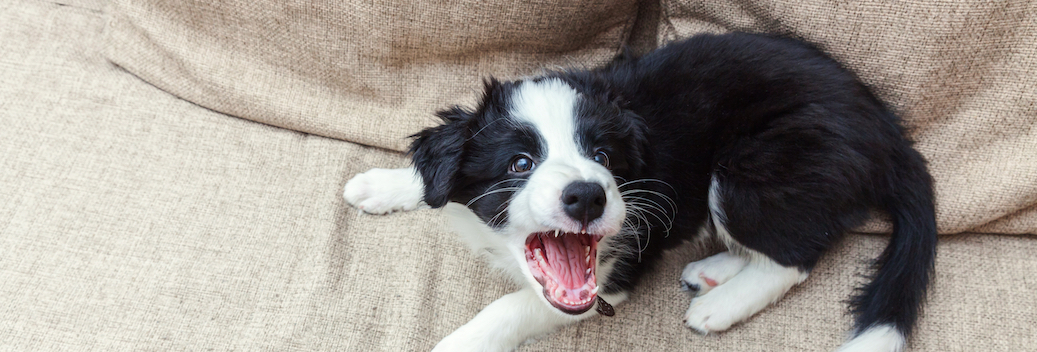Bringing a new puppy into your home is an exciting time.
Your new addition to your fur fam is full of energy and a constant source of entertainment, but chances are that your puppy is showing off their barking talents, too. All puppies will bark now and again, but figuring out how to get your puppy to minimize their barking can make life more enjoyable (and quieter) for your whole family.
- Puppies bark to express a lot of different emotions, like: excitement, boredom, fear, and anxiety.
- First, determine what is causing the barking, then take steps to address the cause using positive reinforcement techniques.
- Try to avoid punishing (or accidentally rewarding) negative behavior, instead, base your training on rewarding positive behaviors.
- Teaching a puppy new skills will take time, so don’t be discouraged and try to be patient.
Why do puppies bark?
Dogs bark for multiple reasons to communicate multiple things, and barking isn’t necessarily always bad behavior. Afterall, it’s how they communicate and express themselves. To understand how to best handle puppy barking, it’s important to understand the reasons why your pup barks.
Here are the most common types of barking you might hear from your pup:
- Alert barking. Also called alarm barking, your dog may bark when they feel that something is invading their space. This behavior can be prompted by your pup feeling extra territorial about your home.
- Play barking. Playtime can be super exciting for pups, and they may bark simply because they’re caught up in the game and just can’t contain themselves. A puppy barking while you’re holding a ball is simply saying, “Throw the ball, already!” Can you blame them?
- Boredom. If your puppy is home alone or is the only one awake at night, they may bark because they’re bored or lonely.
- Attention seeking. Some pups bark to get your attention. Your puppy might bark to alert you to the fact that they need to go potty, are hungry, want to play, or want your attention for another reason.
- Separation anxiety. Some pups have a hard time being left alone and may bark out of stress. If you also notice that your puppy is pacing, being unusually destructive, and having more accidents than usual inside the house, chances are they’re dealing with some separation anxiety.
- Fearful/reactive barking. Your puppy may bark out of fear, too. Puppies who are afraid will often have a stiff body language when they bark.
When your puppy barks, try to pay attention to what’s been going on before and during the episode. Look for clues to help you understand what might be causing your puppy’s behavior. Then, you can take the right steps to address the barking behavior.
How can I get my puppy to stop barking?
Training can play a key role in getting your puppy past their excessive barking. Whether you take on your pup’s training on your own or with a professional, teaching your pup a few meaningful skills can keep the baking at bay. Afterall, good barking manners is an important element of caring for your pup and teaching them to live in your home and function in the world.
Teaching your pup the “quiet” command is a valuable tool that you can use in multiple scenarios.
To teach the command, wait until your puppy barks. Turn to your puppy and tell them “quiet” in a calm, firm voice. Once your puppy stops barking, even for a second, praise and reward them with a small treat.
You will need to repeat this training frequently, over multiple days and weeks, but soon your pup will learn to recognize and listen to the “quiet” command. New skills aren’t learned overnight, so try to be patient with your pup and yourself.
You can watch dog trainer Zak George teach a noisy pup using similar technique below:
Alert barking
If your puppy is barking to alert you of people who are approaching the house, that’s not necessarily a bad thing. It can be helpful to know that your pup will alert you to incoming strangers, whether they’re the mailman or unexpected visitors.
However, it’s also important that your puppy knows to stop barking once you’ve seen the visitor and decided that the situation is safe. Teaching your pup the “quiet” command after your puppy has given you the alert is a great solution.
Play barking
If your puppy is barking while playing, this is another instance where you’ll need to make a call about what’s acceptable and when it starts to get over the top. Barking during play is natural, and it often shows that your puppy is enjoying the play session.
But in some situations, your puppy can get overstimulated and the barking can become excessive. If you notice your dog running around uncontrollably, barking incessantly, and having difficulty calming down, it’s time for a break. Put the toys away, give your puppy some water, and take a breather. Your puppy should stop barking once the energy of their environment shifts.
Boredom
If your puppy is bored, then the key to stopping the barking is to keep your pup entertained. Take your puppy for a long walk before you leave the house. A tired dog is more likely to sleep while you’re gone, so your puppy won’t have the chance to be bored before they start snoozing.
You can also give your puppy plenty of chew toys and interactive playtime, which provides important mental stimulation. Break up these play sessions throughout the day so your puppy doesn’t go too long without something new to do.

Attention seeking
It’s common for puppies to bark for your attention, especially when you’re working on crate training. In these cases, responding to your puppy’s barking will only reinforce this negative behavior.
Instead, wait until your puppy is quiet and then go to them and give them the attention they want. Instead of rushing to put an end to the barking, praise your puppy for positive behaviors like lying quietly in their crate.
Separation anxiety
A new puppy may experience separation anxiety, especially during the first few weeks in your home. To help combat this, you can get your puppy into a daily routine and make sure that your whole family gives them plenty of attention.
If your puppy will be alone for long periods of time, look for a solution like enrolling them in doggy daycare or hiring a pet sitter to stop in to take them for a walk. In addition, especially at the beginning, place your puppy’s crate in a location like a bedroom, where they will feel close to you.
Fearful/reactive barking
If your puppy barks out of fear, then it’s important not to discipline them for their feelings. Instead, gradually socialize your puppy and desensitize them to the things that they are afraid of.
This can be a long process, and you need to be patient. Gradually introduce your puppy to the things that they are afraid of, like other dogs or bicycles, in controlled, safe environments. Give your puppy the chance to inspect these things and get used to their presence. Gradually, your puppy will gain confidence and won’t be afraid of these things anymore.
Avoid making these training mistakes
You’re bound to make some mistakes as you learn to train your puppy. Watch out for these mistakes which are super common when training a puppy to stop barking.
- Using your puppy’s name as punishment. Avoid ever saying your puppy’s name in combination with a command, like “Max, quiet!” or “Max, no!” This habit can cause your puppy to associate their name with something negative and with discipline, but you want your pup to always be excited to hear you say their name, so they come when you call.
- Using pain as punishment. Shock collars, choke collars, and prong collars all use pain to correct a behavior. These training methods can also cause your puppy to lose trust in you. Instead, opt for positive reinforcement, which focuses on rewarding positive behaviors as opposed to punishing “bad” ones.
- Rewarding negative behavior. If your puppy is barking to get your attention and you walk into the room to tell your puppy to be quiet, you’ve just given your pup exactly what they wanted: Attention from you. Instead, it’s important to ignore your pup while they’re barking, then go in to reward their positive behavior once they lie down quietly.
Before we go…
Training your puppy to stop barking will take some time, and it’s important that everyone in your family is consistent in how you approach the training. When it comes to getting your puppy up to speed on good habits and behaviors, it’s a family affair.
If, after several months, your puppy continues to bark nonstop, it might be time to visit the vet. The issue could be diagnosed as a behavioral issue, which might require more aggressive treatment.
If you sign your puppy up for Lemonade Pet right away, and opt in to our behavioral conditions add-on before they start howling all night long, this coverage could help cover the costs of vet-recommended training or medication for behavioral issues like separation anxiety or extreme territorial behavior.
Plus, pet insurance for dogs can help cover vet bills for unexpected accidents and illnesses, plus our Preventative Care package for puppies and kittens can cover lots of your puppy’s care for the first years of life. Now that’s something to wag your tail about!
A few quick words, because we <3 our lawyers: This post is general in nature, and any statement in it doesn’t alter the terms, conditions, exclusions, or limitations of policies issued by Lemonade, which differ according to your state of residence. You’re encouraged to discuss your specific circumstances with your own professional advisors. The purpose of this post is merely to provide you with info and insights you can use to make such discussions more productive! Naturally, all comments by, or references to, third parties represent their own views, and Lemonade assumes no responsibility for them. Coverage and discounts may not be available in all states.





